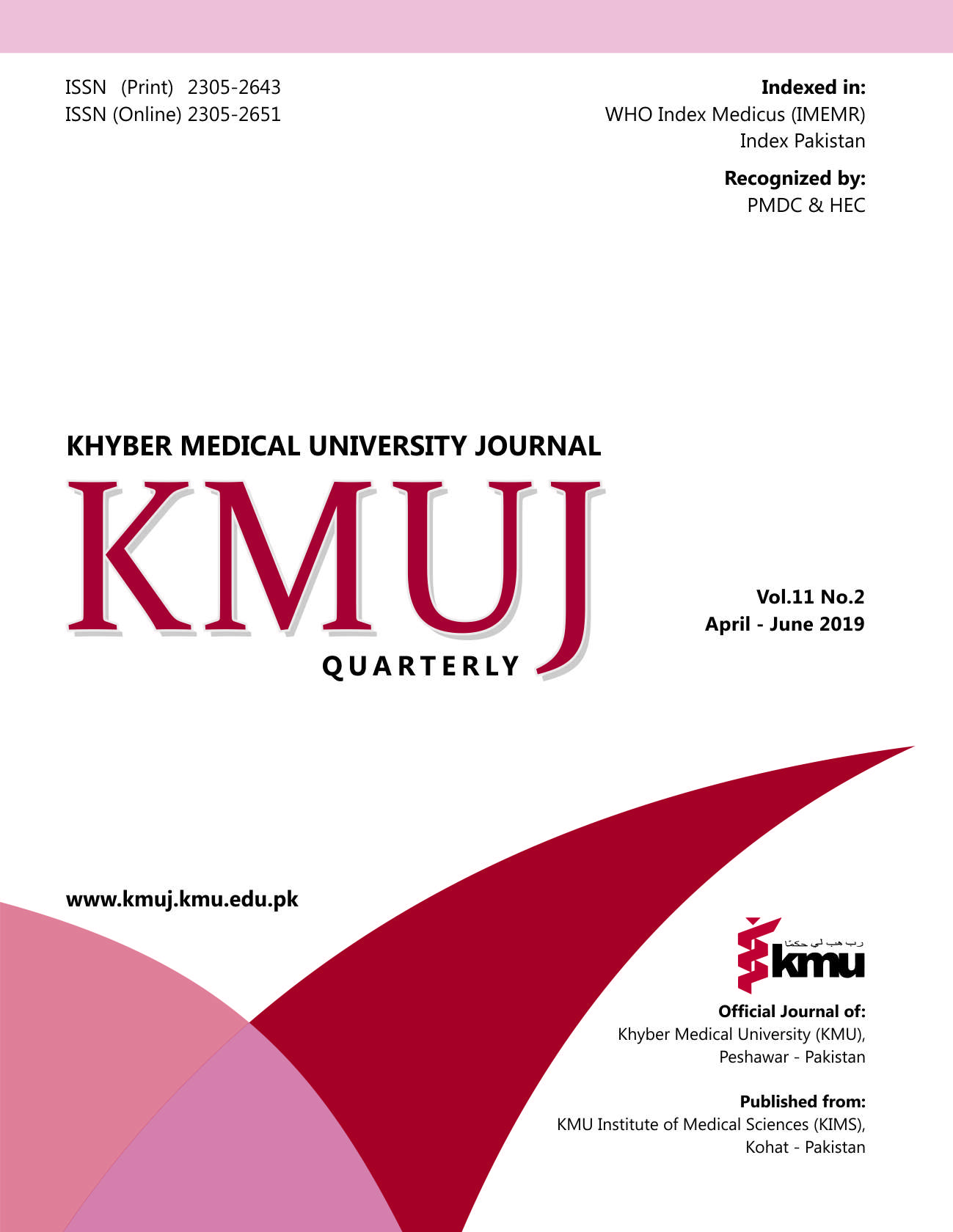RELATIONSHIP BETWEEN PARENTING STYLES AND AGGRESSION IN PAKISTANI ADOLESCENTS
Main Article Content
Abstract
OBJECTIVE: To assess the relationship between parenting styles and aggression in adolescents studying in various schools of Lahore, Pakistan.
METHODS: This cross-sectional study was conducted on 200 adolescents (100 male & 100 females). Parenting Style Questionnaire and Aggression scale were used to collect the data. Sample was selected from 3 schools of Lahore (King Way High School, Shaheen High School and Lahore Garrison School) using purposive sampling strategy. The age range of sample was 14 to 18 years. In the present study we hypothesized; adolescents with authoritarian parents will have high level of aggression as compared to the adolescents of authoritative parents. We used Pearson Correlation and Multiple Regression techniques to find out the results from collected data.
RESULTS: Mean age of participants was 13.09±0.86 years. Significant positive association was found between authoritarian parenting style and aggression (P<0.01) and significant inverse relationship between authoritative style of parenting and aggression (P<0.05) in adolescents. So, parents with authoritarian parenting style had higher level of aggression. Authoritarian parenting significantly predicted (19%) aggression in adolescents, while authoritative parenting style was not a significant predictor of aggression in adolescents.
CONCLUSION: In our study, there is significant effect of authoritative and authoritarian parenting style on aggression and most of the children from authoritarian parents have high level of aggression as compared to authoritative parents.
Article Details
Work published in KMUJ is licensed under a
Creative Commons Attribution 4.0 License
Authors are permitted and encouraged to post their work online (e.g., in institutional repositories or on their website) prior to and during the submission process, as it can lead to productive exchanges, as well as earlier and greater citation of published work.
(e.g., in institutional repositories or on their website) prior to and during the submission process, as it can lead to productive exchanges, as well as earlier and greater citation of published work.
References
Carlo G, Knight GP, Mcginley M, Hayes R. The roles of parental inductions, moral emotions, and moral cognitions in prosocial tendencies among Mexican American and European American early adolescents. J Early Adolesc 2011;31(6):757-8I. DOI: 10.1177/0272431610373100.
Grusec JE. Socialization processes in the family: social and emotional development. Annu Rev Psychol 2011;62: 243-69. DOI: 10.1146/annurev.psych.121208.131650.
Abar CC, Jackson KM, Wood M. Reciprocal relations between perceived parental knowledge and adolescent substance use and delinquency: the moderating role of parent–teen relationship quality. Dev Psychol 20I4;50(9): 2176-87. DOI: 10.1037/a0037463.
Rothrauff TC, Cooney TM, An JS. Remembered parenting styles and adjustment in middle and late adulthood. J Gerontol B Psychol Sci Soc Sci 2009;64(1):137-46. DOI: 10.1093/geronb/gbn008.
Martikainen P, Bartley M, Lahelma E. Psychosocial Determinants of Health in Social Epidemiology. Int J Epidemiol 2002; 31(6): 1091-3. DOI: 10.1093/ije/31.6.1091.
Caprara GV, Pastorelli C. Early emotional instability, prosocial behavior, and aggression: some methodological aspects. Eur J Pers 1993;7(1):19-36. DOI: 10.1002/per.2410070103.
Carlo G, Mcginley M, Hayes R, Batenhorst C, Wilkinson J. Parenting styles or practices? Parenting, sympathy, and prosocial behaviors among adolescents. J Genet Psychol 2007;168(2):147-76. DOI: 10.3200/GNTP.168.2.147-176.
Carlo G, Mestre MV, Samper P, Tur A, Armenta BE. Feelings or cognitions? Moral cognitions and emotions as longitudinal predictors of prosocial and aggressive behaviors. Pers Individ Dif 2010;48(8):872-7. DOI: 10.1016/j.paid.2010.02.010
Darling N, Steinberg L. Parenting style as context: an integrative model. Psychol Bull 1993;113(3):487-96. DOI: 10.1037/0033-2909.113.3.487
Robinson C, Mandleco B, Olsen F, Hart C. Authoritative, authoritarian, and permissive parenting practices: development of a new measure. Psychol Rep 1995;77(3):8I9-30. DOI: 10.2466/pr0.1995.77.3.819
Saleem S, Sana D, Zahid M. Perceived parenting styles in Pakistani adolescents: A validation study. Pak Psychol Res 20I7;32(2): 487-509.
Buss AH, Perry MP. The aggression questionnaire. J Pers Soc Psychol 1992;63(3):452-9. DOI: 10.1037/0022-3514.63.3.452.
Kokeb A, Munaf S, Khan B. Relationship of perceived parental behavior at the stage of adolescent with life satisfaction and aggression of adult daughters. Bahria J Profes Psychol 2014;13(2):1-16.
Steinberg L. We know some things: parent–adolescent relationships in retrospect and prospect. J Res Adolesc 2001;11(1):1-19. DOI: 10.1111/1532-7795.00001.
Steinberg L, Lamborn SD, Darling N, Mounts NS, Dornbusch SM. Over-time changes in adjustment and competence among adolescents from authoritative, authoritarian, indulgent, and neglectful families. Child Dev 1994;65(3):754-70. DOI: 10.1111/j.1467-8624.1994.tb00781.x.
Archer J. Sex differences in aggression in real- world settings: A meta-analytic review. Rev Gen Psychol 2004;8(4):291-322. DOI: 10.1037/1089-2680.8.4.291.
